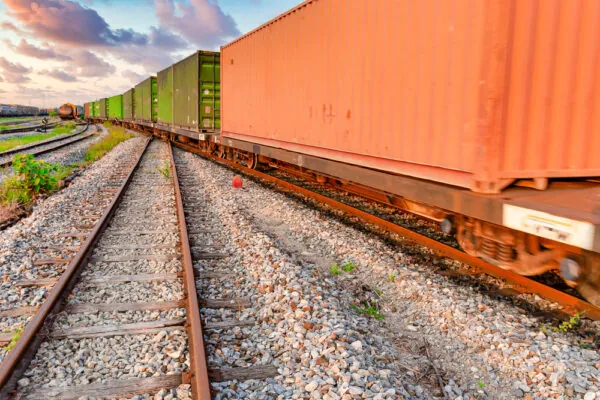Why Is Rail Shipping Important?
Since the birth of railroads in the 1800s, they have been a critical component in transporting large amounts of freight across long distances.
Rail freight is the backbone of transportation and logistics, with many industries relying on the mode of transportation to get their products to their destinations quickly.
According to the Association of American Railroads, rail lines account for 40% of U.S. long-distance freight volume – more than any other mode of transportation.
So why is rail shipping important? Rail transportation offers many advantages for shippers and the logistics industry. With its efficiency, reliability, and economic gain, rail freight shipping is an indispensable part of transportation.

Rail Shipping Efficiency
Shipping freight by rail is a very efficient option, especially for long-distance deliveries that require timely arrival. Trains can transport the equivalent of hundreds of tractor-trailers, while achieving fuel efficiency rates four times greater than trucks.
This type of efficiency contributes to its environmental impact – shipping via trains is a more sustainable option than shipping via trucks. Transporting just one ton of freight requires only a single gallon of diesel fuel to travel 470 miles.
Rail freight shipping also produces fewer greenhouse gas emissions per ton-mile than road transport. Shippers seeking sustainable solutions should highly consider rail freight, as it makes it a compelling option.
Intermodal transportation is an integral part of logistics, and it is widespread for rail freight to work in tandem with other modes of transport. It’s very common for many seaports and airports to be in close proximity to railroads to facilitate intermodal operations, increasing efficiency.
Rail Shipping Reliability
Not only does rail freight offer top-notch efficiency, but it also offers reliability – ensuring that the shipment will reach its destination on time.
Rail transport’s ability to handle large volumes is particularly advantageous for bulk cargo. When a business is shipping a large amount of freight, mitigating delays is crucial.
Many rail networks have robust infrastructure and investments in maintenance to certify that the tracks and equipment are in good condition – ensuring reliability.
An additional way in which rail transportation is reliable is that it typically involves fewer transfers compared to trucking.
Because a shipment is typically on one train car for the duration of the trip, the chances of delay or damage to the cargo during the journey are significantly reduced. Additionally, rail transport is statistically safer than road transport, reducing the risk of accidents or cargo damage.
Rail transportation’s investment in infrastructure and consistent schedules offers reliability that other modes of transportation may not be able to offer.
Economic Gain with Rail Shipping
Rail freight also offers economic gain for many businesses. Rail transport can connect producers to markets in a short amount of time, which enhances trade. Not only does rail shipping assist in diversifying markets, but it also helps provide jobs in various sectors.
Rail shipping creates jobs for train operators, maintenance technicians, freight brokers, and rail yard workers. Rail networks support incredible economic development, which is essential for the success of businesses.


Rail freight shipping plays a crucial role in modern transportation. Without it, the logistics industry would not be the powerhouse it is today.
Its ability to transport large volumes of various types of cargo while minimizing fuel consumption positions it as a key player in addressing economic and environmental challenges.
With rail shipping’s high performance and reliability, it has completely revolutionized the transportation of goods over the past century, and it still plays a crucial role in significantly enhancing supply chain efficiency now and in the future.



